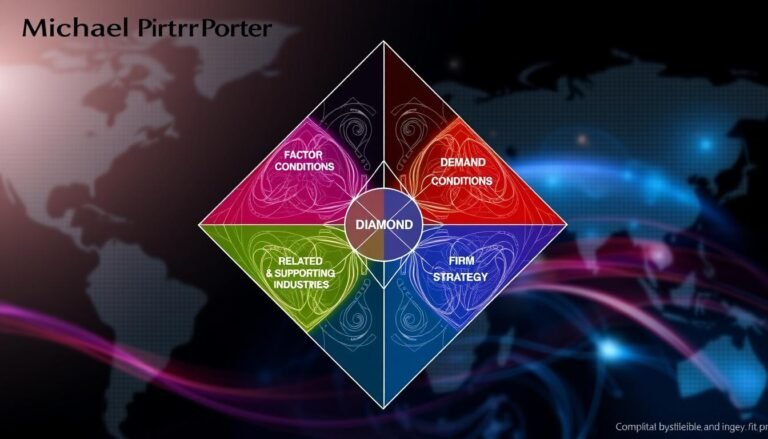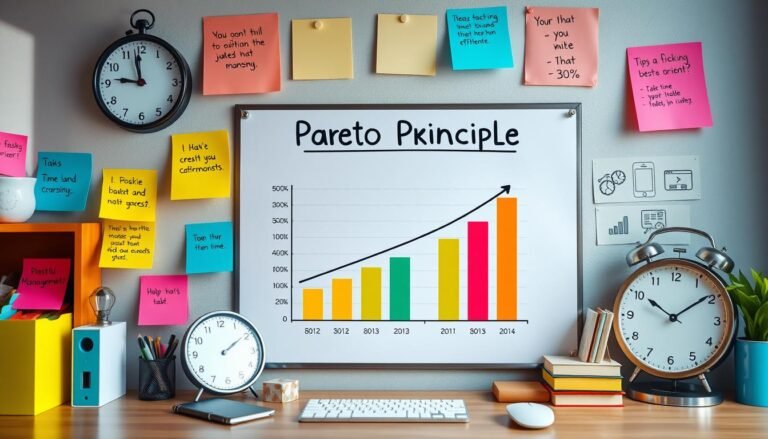Sustainability and Business Theory: Creating a Better Future
Can businesses change to help solve global problems? What if we could mix sustainability and business theory to make a better future for everyone? This question is key to our discussion. We’ll look into how sustainability, business theory, and making a better future can work together.
The way companies think about corporate responsibility is changing. Now, environmental responsibility, ethical practices, and stakeholder engagement are key. Companies must balance making money and doing good. This has made sustainability a key idea, changing old business models and what companies aim to do.
This article will dive into how sustainability and business theory connect. We’ll look at the ideas and examples that are changing corporate social responsibility and eco-innovation. Let’s see how companies can be forces for good, helping people, the planet, and society.
Redefining Corporate Purpose for the Common Good
The old way of doing business focused too much on making money without thinking about the bigger picture. Now, a new movement wants companies to think about how they can help everyone, not just their shareholders. This means moving away from a model that only looks out for a few to one that cares for all stakeholders.
The Traditional Corporate Model and Its Flaws
The old corporate model put shareholders first, aiming to make money for them. This left other groups like employees, customers, suppliers, and the community behind. Companies often ignored the long-term effects of their actions, hurting the environment and society for the sake of quick profits.
Many studies have pointed out the problems with this old way of doing things. For instance, a study found that almost all environmental claims on products were either false or could confuse people. This shows how often companies make false or misleading claims about being green.
“The sustainable development language is often used to promote potentially unsustainable activities, leading to concerns about cosmetic environmentalism.”
Trying to measure how companies affect the environment and society is hard because it’s not as simple as looking at profits. Experts like John Robinson, Milton Friedman, and Ray C. Anderson have shared their thoughts on how businesses should handle sustainability and look out for everyone’s needs.
The idea of the triple bottom line, which looks at people, profit, and planet, offers a broader way to see if a business is doing well. But, figuring out what sustainability means and how to measure it is tricky. This has led to worries about companies just pretending to be green without really changing.
The Emergence of Stakeholder Capitalism
In recent years, stakeholder capitalism has become more popular. It challenges the old way of focusing only on shareholders. This new approach looks at the needs of all stakeholders, like employees, customers, communities, and the environment.
This change matches the growing focus on Environmental, Social, and Governance (ESG) factors. It also looks at a company’s social and environmental impact, not just its profits. The author’s research found four types of stakeholder capitalism, each with different levels of focus on stakeholder interests.
Now, we’re moving towards a model that includes more stakeholders in decision-making. This shift aims to help different groups and lead to better long-term financial gains. In recent years, more articles and discussions have highlighted the importance of stakeholder capitalism for a sustainable and inclusive world.
“Stakeholder capitalism aims to balance the power among stakeholders in the global market, and its principles can help achieve Sustainable Development Goals (SDGs) by 2030.”
Groups like governments, industries, and NGOs are key to reaching the SDGs with stakeholder capitalism. Research shows that SDGs 8, 9, and 17 are most affected by this approach. SDGs 6, 14, and 15, which focus on the environment, are less covered in stakeholder capitalism studies.
Building strong stakeholder relationships and partnerships is vital for achieving the SDGs. The ideas behind stakeholder theory help show how stakeholder capitalism can aid in sustainable development.
The global community aims to meet the SDGs by 2030 for sustainable development. Stakeholder capitalism offers a hopeful way to rethink corporate goals and work towards a fairer, more sustainable future.
Sustainability and Business Theory: Creating a Better Future
Today, sustainability and business theory go hand in hand. Companies aim to make a better future for everyone. At the core is the Triple Bottom Line (TBL), brought up by John Elkington in 1994. It focuses on social, environmental, and economic sustainability.
Companies work on the social side by fighting poverty and inequality. They improve education and healthcare and help local communities. On the environmental side, they cut down on carbon emissions and waste. The economic side looks at making money, profits, and returns for shareholders.
Using the TBL means companies must track and report on their social and environmental work. But, it’s hard to compare companies because of different reporting methods. The ESG Summit Europe, set for Q4 2023 in Madrid, will talk about ESG issues and how to improve reporting in the EU.
As companies aim for a sustainable future, thinking big and using new ideas is key. By looking at the big picture and innovating, companies can make lasting, positive changes. These changes support the Sustainable Development Goals and help make the world better for everyone.
“The future of business is sustainability.” – Sir Richard Branson
Principles of a Sustainable Business Model
In today’s fast-changing business world, it’s clear that companies need to be sustainable. A sustainable business model looks beyond just making money now. It focuses on the long-term health of everyone involved, like employees, customers, communities, and the planet.
Equitable Wealth Distribution
A key idea in a sustainable business is equitable wealth distribution. Companies aim to spread wealth fairly among everyone who helps them succeed. This means paying fairly, being open about pay, and helping employees grow with the company.
Radical Transparency and Accountability
Radical transparency and accountability are key for sustainable businesses. They share their goals, progress, and problems openly. This builds trust and keeps them responsible for their actions and their effect on the world.
By following these ideas, companies can make long-term value and help create a better future. Sustainable business models focus on ethical practices, green initiatives, and moving towards a circular economy. This helps solve big environmental and social problems.
“Sustainable business models are not just good for the planet, they’re good for business. By prioritizing long-term value creation and the well-being of all stakeholders, companies can gain a competitive edge and build a more resilient future.”
The Role of Systems Thinking and Regenerative Practices
Businesses and society face big challenges that need a complete, connected way of thinking. This is where systems thinking and regenerative practices help. They offer a new way to work towards sustainable development.
Today, companies deal with issues from globalization, tech changes, and climate change. Systems thinking gives a new way to handle these complex problems. Leaders learn to see the big picture by looking at money flows, supply chains, and how they connect with customers. This helps them make better decisions for the future.
Regenerative practices use systems thinking to build strong, sustainable business models. They focus on feedback loops to improve or fix problems in a system. This is key for making smart choices. Working together under systems thinking helps everyone understand each other, avoiding wrong assumptions about big challenges.
But, both private and public groups find it hard to really add sustainability into their work. They often choose quick profits over investing in regenerative practices for the long run. Not having clear goals or ways to measure sustainability makes it harder to see how these practices work.
To make the most of systems thinking and regenerative practices, companies need to think big. They should look at the big picture and think about how their choices affect people and the planet over time. By doing this, businesses can help make a better, more sustainable future.
Pioneering Companies and Their Net Positive Initiatives
More companies are now focusing on sustainable business practices. They’re leading the way by using net positive initiatives. These efforts aim to make a positive impact on the environment, society, and their stakeholders.
BT, a British telecom giant, is one such company. It plans to be a net positive business by 2030. This means it will remove more carbon from the atmosphere than it produces. BT also wants to increase the reuse and recycling of its products, helping the circular economy.
Kingfisher, a European home improvement retailer, is another example. It has made sustainability and environmental responsibility key parts of its business. The company uses sustainable materials and energy-efficient practices in its stores. It also works closely with stakeholders, promoting a culture of corporate social responsibility.
IKEA, a global furniture company, is also a leader in net positive initiatives. It aims to be climate positive by 2030, reducing more greenhouse gas emissions than it produces. IKEA plans to use only renewable and recycled materials in its products. This shows its commitment to sustainable business practices.
These companies inspire others to rethink their goals and focus on sustainability. As more businesses follow their example, we can look forward to a future where net positive initiatives are common. This will help create a more sustainable and fair global economy.
“The future of business is not about optimizing for short-term profits, but about creating long-term value for all stakeholders.”
Conclusion
This article has shown how important sustainability and business theory are for a better future. By changing how companies work, focusing on all stakeholders, and using sustainable business models, companies can make a big difference. They can tackle big challenges and help meet the Sustainable Development Goals.
It talked about the need for thinking big, using nature’s ways, and doing more good than harm. This gives businesses a way to make a future that’s fair, open, and good for the planet.
The data shared shows how big of a deal sustainability is for businesses now. With most people wanting to buy less to protect the environment, and sales of green products going up, there’s a big chance for companies that focus on being sustainable. Also, most top bosses would tell others to support companies with strong values, and companies that do well in ESG ratings often beat the market.
Looking ahead, we see companies like Schneider Electric and others leading the way in making a positive change. Their efforts, along with more focus on teaching sustainability in business schools and more money going into impact investing, point to a future where sustainability and business work together for a better world.
Source Links
- The 3 Pillars of Corporate Sustainability
- Why Is Sustainability Important In Business? | Green Business Benchmark°
- Corporate Sustainability and Redefining the Future of Business
- Transcript: Redefining Corporate Purpose
- Business Roundtable Redefines the Purpose of a Corporation to Promote ‘An Economy That Serves All Americans’
- What Does “Stakeholder Capitalism” Mean to You?
- How can Stakeholder Capitalism contribute to achieving the Sustainable Development Goals? A Cross-network Literature Analysis
- Beyond Profits: How the Triple Bottom Line Theory is Transforming Business for a Better World
- Global DBA in Sustainability | SKEMA
- Master’s in Sustainability | Presidio Graduate School
- What Is a Sustainable Business Model?
- Sustainable international business model innovations for a globalizing circular economy: a review and synthesis, integrative framework, and opportunities for future research – Journal of International Business Studies
- Systems Thinking in Business. How does it Improve Workplaces?- SixSigma.us
- Systems thinking for organisational sustainability
- Net Positive: The Future of Sustainable Business (SSIR)
- What is Net Positive? | Forum for the Future
- The Importance of Sustainability in Business | HBS Online
- Why all businesses should embrace sustainability & how they can do it
- The Next Phase of Business Sustainability (SSIR)







